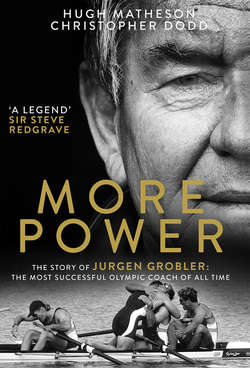Читать книгу More Power: The Story of Jurgen Grobler: The most successful Olympic coach of all time - Christopher Dodd - Страница 8
ОглавлениеPreface
‘Neil, you are a world champion. Now go and derig the boat.’
– JURGEN GROBLER
As More Power went to press, Jurgen Grobler was at the start of his eighth Olympiad as Britain’s chief rowing coach for men, the first year of the four-year cycle that began as the Olympic flame died in Rio’s stadium and will end four years later in Japan when he pilots a voyage to the Tokyo Olympics of 2020. In each of the previous seven Games, crews under his personal coaching have won gold medals, including two in Rio in 2016. At most of the world championships in non-Olympic years, his crews have also won gold medals. The pressure has never been greater for a man in his seventies who began his sensational run of successes in a previous life.
Grobler was brought up in Magdeburg, East Germany, studied at the hothouse of sporting achievement, Leipzig University, and produced Olympic golds in three Games for the country until the Berlin Wall collapsed in 1989, thawing the Cold War and leading to a new, united Germany. His forty-year Olympic career compares with no other in the history of sport.
From Munich when he was 26 to Rio when he was 70, his athletes have gathered medals on the podium while he has stood nearby with joy and fulfilment on his face. But behind the tears in his eyes, his next campaign is beginning to take shape.
For the few engaged in full-time sport to the millions who watch and dream, the prize-giving and medal-kissing rituals – ceremonies with oldies in blazers and the winners swollen with muscular pride – are as glamorous as anything offered in life. Those peaks are reached only by doing a life term in grim physical exhaustion inspired solely by fear of failure. That’s where Jurgen has lived six days a week for fifty years since the very beginning of his life in rowing at the German College of Physical Culture in Leipzig when he was preparing to climb the podium. Fifteen thousand days, perhaps, of anxiety and expertise, of working through simple solutions to complex problems, always alert for weakness in his athletes and in himself.
His job has offered extreme stress every day since he left school, and the matrix of his economic, political and social life has been as crisis-ridden as anyone’s who has avoided living through a war. When he signed on to become a rowing coach in East Germany, it was an elite profession in a country which had chosen sport as its means of expression to avoid admitting that it was an expendable buffer of the Soviet Union, which in turn was suffering a bad reaction to the strain of its own contradictions.
He was one in a population of fifteen million, many of whom thought the grass was greener on the other side of the concrete wall that had been built ‘for the protection’ of the people, but where they were shot if they did not agree that they were happier where they were.
Countries like East Germany have always depended on State Security and on police, sometimes secret, sometimes public, but always brutal. Every citizen, Jurgen not excepted, has to determine the degree of collaboration he will offer to live the life that suits him and his family. There is discretion in each person’s decision: you can choose to help the state and thrive, or you can offer less and get back much less. No one could treat the GDR with lofty humour and get away with it. Even the elites of the communist party, the SED – the equivalents of Eton, Oxford and a Tory cabinet in Britain – could not crack a joke and survive.
When the GDR suddenly fell apart in 1989, choices had to be made and opportunities grasped. Jurgen brought his family to live in Henley-on-Thames when he was hired to coach the world’s best oarsmen of the time, Steve Redgrave and Matt Pinsent. By fate, luck or design, he exchanged the world’s richest but now defunct rowing country for one destined – with his significant help – to rise to the top of the performance table.
This is his story.
